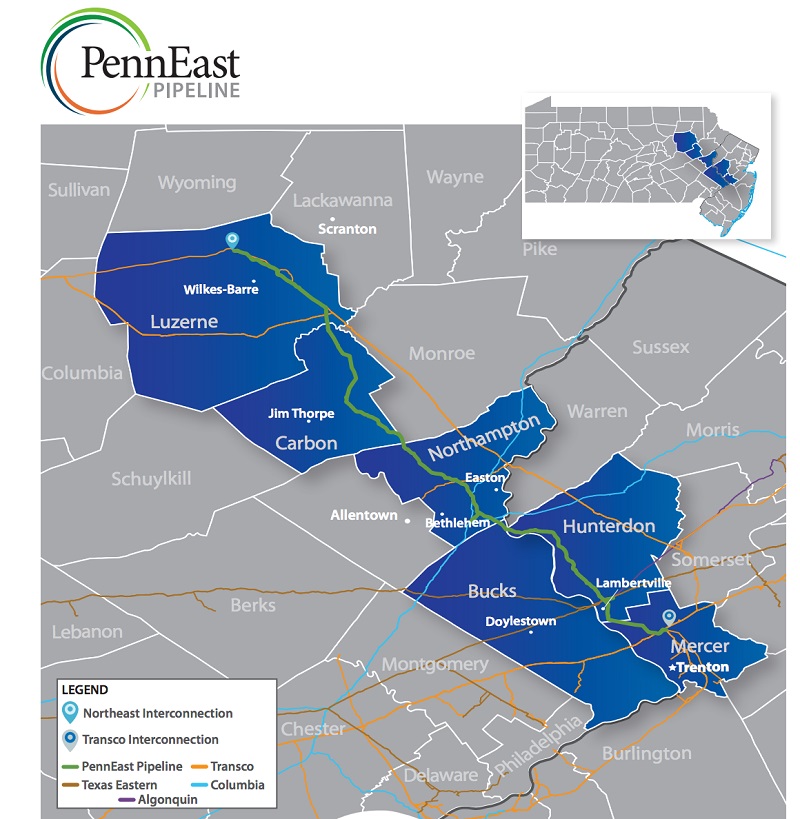PennEast Pipeline Faces New Jersey in Supreme Court Hearing Next Week
By Maddy McCarty, P&GJ Digital Editor
PennEast Pipeline Company is expected in the U.S. Supreme Court next week, according to the court’s schedule.
The Supreme Court agreed to hear PennEast’s appeal to a ruling that prevents to company from seizing land in New Jersey through eminent domain. Arguments for the PennEast Pipeline Co. V. New Jersey case are scheduled for April 28, according to the Supreme Court’s schedule which was last modified March 19.
The 36-inch, 116-mile (914-mm, 187-km) pipeline would carry as much as 1 Bcf/d (28 MMcm/d) of natural gas from northern Pennsylvania to New Jersey. The project includes construction of an underground pipeline and would deliver affordable energy to families and businesses in New Jersey and Pennsylvania, according to Global Energy Infrastructure project data.
The hold-up is the issue of whether a section of the U.S. Natural Gas Act would allow PennEast access to more than 40 parcels of land, which the 3rd Circuit Court ruled it does not. Much of the land is owned by New Jersey.
Court filings show the council of state governments, the national league of cities, the U.S. Conference of Mayors, the International City/County Management Association and the International Municipal Lawyers Association believe the court will not “make such a fundamental change” unless it is clear Congress intended to do so.
“Allowing private parties to invoke the Federal government’s authority to condemn State lands would
dramatically alter the Federal-State balance,” am amici curiae brief the organizations filed April 7 in support of New Jersey said. “States have a sovereign prerogative—and in many cases, a constitutional obligation—to preserve, manage, and control State land for the benefit of their citizens.”
PennEast argues Congress was clear in its charge to the Federal Energy Regulatory Commission to ensure the availability of affordable domestic energy delivered via natural gas infrastructure.
“Congress passed the Natural Gas Act specifically to avoid state and local vetoes of interstate projects found by federal regulators to be in the public need and benefit,” Tony Cox, Chair of the Board of Managers of the PennEast Pipeline Company, said in a statement. “The misguided Third Circuit ruling in fall 2019 turned nearly 80 years of federal government interpretation and industry practice on their heads.”
The 3rd Circuit ruling stated that while the Gas Act provision gave companies eminent domain powers, it did not necessarily follow that states can be sued to enforce those powers. It also pointed out that the U.S. Constitution’s 11th Amendment limits the ability of private parties to sue a state, unless that state consented.
Many legal experts think it is unlikely that the 3rd Circuit Court’s ruling will be overturned, but PennEast raises a valid legal question, and Cox called the Supreme Court’s decision to hear the case “a major step forward.”
PennEast expects to have the first phase of the project in service in 2022 and the second phase in service in 2024, if it is successful in court.
Related News
Related News

- Kinder Morgan Proposes 290-Mile Gas Pipeline Expansion Spanning Three States
- Enbridge Plans 86-Mile Pipeline Expansion, Bringing 850 Workers to Northern B.C.
- Three Killed, Two Injured in Accident at LNG Construction Site in Texas
- Tallgrass to Build New Permian-to-Rockies Pipeline, Targets 2028 Startup with 2.4 Bcf Capacity
- TC Energy Approves $900 Million Northwoods Pipeline Expansion for U.S. Midwest
- U.S. Pipeline Expansion to Add 99 Bcf/d, Mostly for LNG Export, Report Finds
- Enbridge Adds Turboexpanders at Pipeline Sites to Power Data Centers in Canada, Pennsylvania
- Great Basin Gas Expansion Draws Strong Shipper Demand in Northern Nevada
- Cheniere Seeks FERC Approval to Expand Sabine Pass LNG Facility
- Heath Consultants Exits Locate Business to Expand Methane Leak Detection Portfolio





Comments